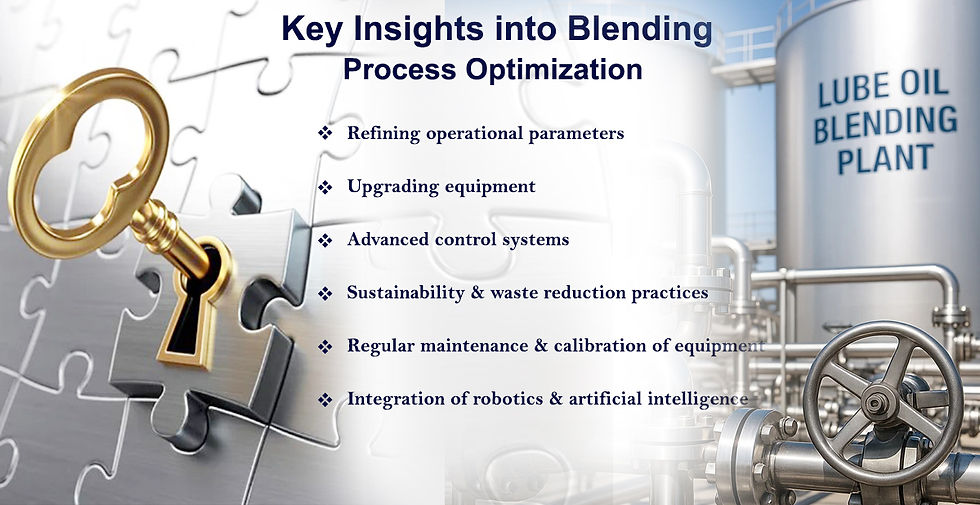Artificial Intelligence (AI) In Lubricant Industry
- LINUS PROJECTS

- Dec 10, 2024
- 3 min read

Artificial intelligence (AI) encompasses a range of technologies that allow machines to execute tasks usually carried out by humans. Machines equipped with AI capabilities can perceive, comprehend, and react to both spoken and written language. Additionally, they possess the ability to analyse data and provide recommendations. Artificial intelligence is integrated into various technologies, teaching robots use artificial intelligence (AI) to help with teaching and learning. Artificial intelligence (AI) also powers services chatbots, and social media platforms. AI-powered virtual assistants can understand and respond to natural language, autonomous vehicles can navigate roadways with enhanced precision, and AI-generated art and music are challenging traditional notions of human creativity.
John McCarthy is regarded as the pioneer of Artificial Intelligence. He was an American computer scientist who is credited with coining the term "artificial intelligence."
Envision a bustling factory environment, alive with the movement of robots, all orchestrated by the unseen influence of artificial intelligence. robots are specifically created to assist humans in various tasks, such as machine tending and quality inspection. With the support of AI, these robots can learn to perform new functions and handle delicate components with remarkable precision.
Manufacturers can unlock unprecedented levels of precision, efficiency, and profitability. These AI-powered systems can analyze vast troves of historical production data, identify subtle patterns and anomalies, and make real-time adjustments to optimize every aspect of the manufacturing workflow, to predictive maintenance of mission-critical equipment, to the fine-tuning of production parameters on the shop floor.
The application of artificial intelligence and machine learning with the principles of physical chemistry, is significantly advancing operational efficiency in various fields. The integration of predictive maintenance capabilities powered by artificial intelligence is revolutionizing the way organizations approach the critical function of equipment upkeep, repair-focused model to a truly proactive, performance-optimizing approach that minimizes disruptions, extends asset lifespans, and drives marked improvements in overall operational efficiency and profitability.
It is important for the workforce to cultivate new abilities. Focusing on areas such as data analysis, Workers will need to be able to interpret complex information, identify patterns and trends, and extract meaningful insights that can inform business decisions and strategies. By proactively developing these new competencies, workers can future-proof their skills and position themselves for success in an increasingly Artificial Intelligence driven economy.

Industrial lubrication manufacturers can significantly benefit from the implementation of Artificial Intelligence (AI) technologies. These companies, which produce a wide range of lubricants and oils for heavy machinery, equipment, and vehicles, face a number of complex challenges that AI is uniquely positioned to address. For one, the formulation and blending of lubricants is an intricate process that requires extensive data analysis to optimize viscosity, additive packages, and other key properties. AI-powered predictive analytics can comb through vast troves of historical production data, identifying subtle patterns and insights that human analysts may easily miss. This allows manufacturers to fine-tune their recipes and processes, improving product quality and consistency. Additionally, AI can be leveraged for predictive maintenance of the company's own equipment and supply chain logistics.
By analyzing sensor data and past performance, AI systems can predict when machinery is likely to fail or require servicing, enabling proactive maintenance that minimizes downtime. Lubricant manufacturing plants in particular are adopting these technologies which facilitate cost-effective maintenance and enhance machine performance.
Artificial Intelligence can optimize routing, inventory management, and demand forecasting, ensuring lubrication products are delivered to customers exactly when needed. For industrial lubrication manufacturers seeking to drive efficiency, quality, and customer satisfaction, Artificial Intelligence represents a transformative technology with immense untapped potential. Sustainability enhances efficiency, elevates brand value, cultivates goodwill, and strengthens reputation. Process Design and Automation Consulting can provide streamline blending times, cut costs, and ensure customer satisfaction.
Recognizing the transformative potential of robotics, a growing number of skilled professionals are now joining the workforce. As the robotics industry continues its upward trajectory, organizations that prioritize the strategic integration of Robotic Process Automation RPA and Intelligent Process Automation IPA solutions will be well-positioned to thrive in the fast-paced, digitally-driven business environment of the future.
Linus Projects (India) specializes in fully automated lube oil blending plant machinery, featuring a continuous blender and an auto-cleaning system. The setup incorporates a series of VFD (variable frequency drive) controlled pumps, flow meters, and automated valves. The entire operation is managed through automation and PLC control, complemented by a SCADA interface. Additionally, packaging robots provide real-time insights into packaging operations, product placement, and quality assurance protocols. Collaborating with Linus Projects (India) you can incorporate with latest technology in processing Lube Oil Blending Plant (LOBP) business.




Comments